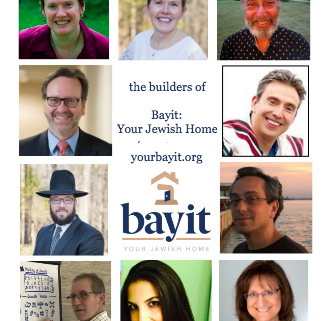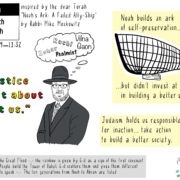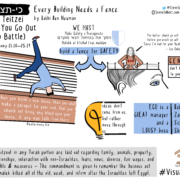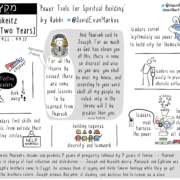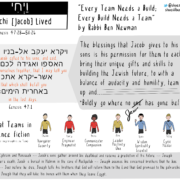All of us, taking up our tools together
 The founding Builders at Bayit include both laypeople and clergy. We are rabbis and laypeople, lawyers and educators, fundraisers and administrators, rooted both inside and outside the denominations. I am a layperson working with a group that also includes talented and enthusiastic clergy, and together we aim to help define and redefine our collective Jewish story. Why would I want to even consider doing such a thing?
The founding Builders at Bayit include both laypeople and clergy. We are rabbis and laypeople, lawyers and educators, fundraisers and administrators, rooted both inside and outside the denominations. I am a layperson working with a group that also includes talented and enthusiastic clergy, and together we aim to help define and redefine our collective Jewish story. Why would I want to even consider doing such a thing?
My answer to that question is rooted in my own spiritual journey. For many years I had nothing to do with my Jewish roots. I was so far removed from Judaism that the only way I knew it was time for a major holiday would be to read about it in the newspaper or see it covered on the local TV news. The Judaism I had known was vacuous. I believed it had nothing to offer.
I wandered in the proverbial wilderness for decades, looking for a spirituality that was meaningful, that was urgent, that was “modern,” that felt real. I was looking for a practice that didn’t feel stuck in the past, but could incorporate the best of history with the modernity of today. I was seeking a way to more fully understand, to more deeply experience, and to know the awe of creation.
I found a path back in to Judaism through the trans-denominational phenomenon known as Jewish renewal, and that path led me to collaborating with the other builders at Bayit.
What excites me about we who are building Bayit is that we are all deeply committed to a Judaism that seeks to be be personally transformative, wonderfully rich, and deliciously communal. We aim to connect seekers with spiritual technologies that can meet their needs. We aim to build both with and for those who want more, and need more, than may have been offered by the Judaism they inherited.
To those who have found Judaism empty, we say: stay and experience how much more Judaism can be. For those who are already deeply practicing your Judaism, we say: join us in going deeper still. Bayit can assist all who want to take a deep dive into their Jewish life and into spiritual life writ large.
As we build together, we intend not to be bound by convention. We intend not to be bound by what was done before or what worked or didn’t work before. Ours is a boundary-crossing approach, a post-denominational approach: an approach that intentionally brings together clergy and laypeople, congregations and solo practitioners, traditional pulpit contexts and “pop-ups,” people and communities rooted across the denominations and also people and communities rooted outside of the denominations.
To whet your appetite: one of our initial keystone projects is an Innovation Pilot program, a spiritual lab where a variety of congregations both across and beyond the denominational spectrum will try out new ideas and practices, and will report back on what worked and did not work and what might be done differently next time.
What ideas do you have for what Bayit might do and be? There are no “should” or “musts.” We are open. We are excited to partner with individuals and organizations. We will be there with and for one another as we explore new ideas/tools/approaches that help to continually renew our Judaism and make that Judaism every bit as relevant today as it was for our ancestors.
My hope, my aspiration, my prayer, is that we at Bayit can provide tools and spiritual technologies to enable people to fully and deeply experience all that spiritual practice can offer. Core to our philosophy is the idea that all of us can be (indeed: must be) builders of the Judaism that the future needs us to co-create. Building a renewed Judaism is not the task of clergy alone. It needs all of us, taking up our tools together.

Steven Green

